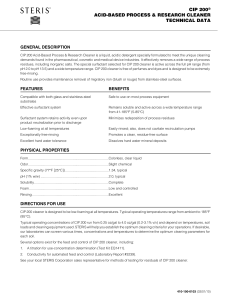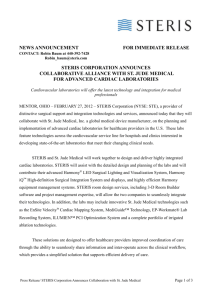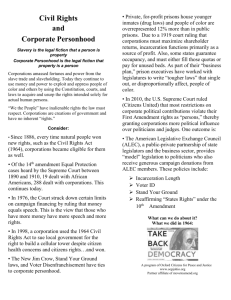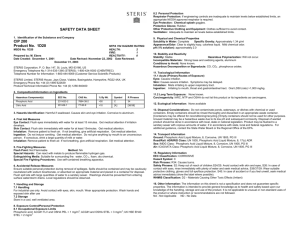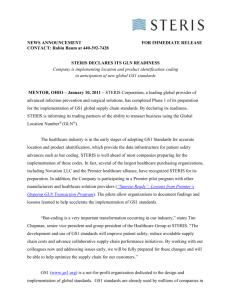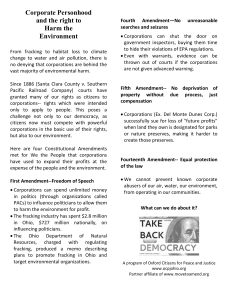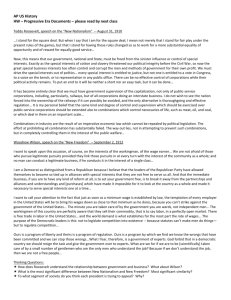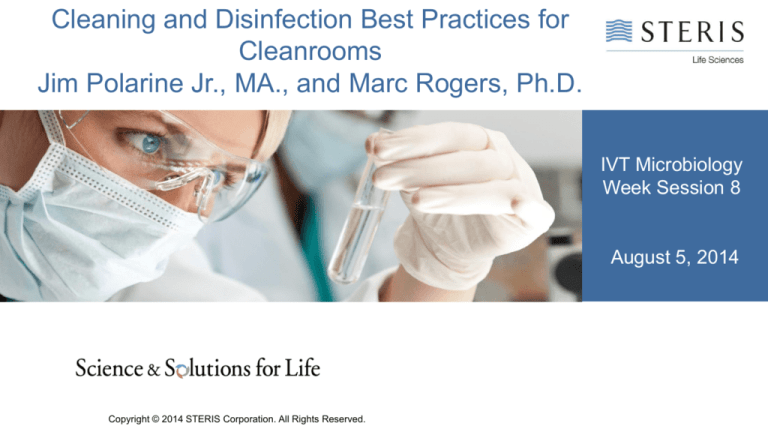
Cleaning and Disinfection Best Practices for
Cleanrooms
Jim Polarine Jr., MA., and Marc Rogers, Ph.D.
IVT Microbiology
Week Session 8
August 5, 2014
Copyright © 2014 STERIS Corporation. All Rights Reserved.
Agenda
Regulations
Bioburden Control
Cleaning and Disinfection
oWhy? FDA 483s
oSafety
oApplication & Equipment
oFrequency based on ISO 14644 classification
oRotation & Rinsing
oDisinfectant Validation
Copyright © 2014 STERIS Corporations. All Rights Reserved.
2
European Regulations
• BPD-The effects on Biocides in Europe.
• REACH Directive
Copyright © 2014 STERIS Corporations. All Rights Reserved.
Biocidal Product Directive
•
•
Approval Process for biocides: active substances and formulations
– Annex I: positive list of approved substances
– Listing on Annex I triggers review of Formulations
Review Program for existing active substances
– Range of Product Types
– Driven by Review Regulations
– Identified and Notified Substances
• Identified – Active Substances that are stated to be on the market
by suppliers
• Notified – Active Substances that organisations commit to
supporting through the review process
Copyright © 2014 STERIS Corporations. All Rights Reserved.
Biocidal Product Directive
• Active substance identified but not notified
– For example, para tertiary amyl phenol (ptap)
– Products containing this active must be off the market by 1
September 2006
• No supply or use
• Active substance notified
– National legislation, if in place, applies until review +/- December
2010
Copyright © 2014 STERIS Corporations. All Rights Reserved.
Biocidal Product Directive
• Next Steps for Suppliers of Active Substances in
Disinfectants and General Biocidal Products
–
–
–
–
Submit active substance technical dossiers by 31 July 2007
Member States review deadline November 2008
EU discussion forum deadline November 2009
EU decision and active substance listing for that product type +/December 2010
– Formulated Product Dossiers due for these product types +/December 2010 + 3 months
10
Copyright © 2014 STERIS Corporations. All Rights Reserved.
US Disinfectant Regulation
• Federal Insecticide, Fungicide and Rodenticide Act
(FIFRA)
• All germicidal cleaners fall under the FIFRA as amended
(1988) and administered by EPA
• FDA regulation as medical device per Food Quality
Protection Act of 1996 - if used to reprocess other
medical devices or if used as a sterilant for medical
devices
Copyright © 2014 STERIS Corporations. All Rights Reserved.
EPA requirements
• Environmental Protection Agency (EPA)
• Safety, use, disposal
• Efficacy
AOAC Official Methods of Analysis
Copyright © 2014 STERIS Corporations. All Rights Reserved.
EPA classifications
• Sanitizer
• Disinfectant
• Sterilant
Copyright © 2014 STERIS Corporations. All Rights Reserved.
Sanitizer
• Proper use results in bacteria reduction of
• > 99.9%
• Used on precleaned surfaces
Copyright © 2014 STERIS Corporations. All Rights Reserved.
Disinfectant
• Proper use results in 100% kill of vegetative bacteria,
target viruses and target fungi
• 4 Log reduction of bacteria
• 3 Log reduction of viruses
• 6 Log reduction of fungi
• May or may not require precleaning
Serum efficacy—5% BSA and EN methods differ
Copyright © 2014 STERIS Corporations. All Rights Reserved.
Sterilant
Proper use results in 100% kill of all microorganisms, including
bacterial spores
(B. subtilis, C. sporogenes)
6-7 Log reduction
Always requires pre-cleaning
Copyright © 2014 STERIS Corporations. All Rights Reserved.
Agenda
Regulations
Bioburden Control
Cleaning and Disinfection
oWhy? FDA 483s
oSafety
oApplication & Equipment
oFrequency based on ISO 14644 classification
oRotation & Rinsing
oDisinfectant Validation
Copyright © 2014 STERIS Corporations. All Rights Reserved.
13
Review - Microflora in Cleanrooms (U.K.)
• Tim Sandle
• PDA J Pharm Sci and Tech 2011, 65:392-403
• A Review of Cleanroom Microflora: Types,
Trends, and Patterns
• Examined isolates from 2000-2009 in U.K.
• Grade A/B and C/D
Copyright © 2014 STERIS Corporations. All Rights Reserved.
Review - Microflora in Cleanrooms (U.K.)
Copyright © 2014 STERIS Corporations. All Rights Reserved.
Review - Microflora in Cleanrooms (U.K.)
Genus
A/B (6729)
C/D (2500)
Micrococci (and related)
38%
40%
Staphylococci
21%
11%
Bacillus (and related)
13%
10%
Pseudomonas (and related)
<1%
8%
Corynebacterium (and related)
3%
5%
Rhodococci
<1%
N/A
Fungi
N/A
3%
Copyright © 2014 STERIS Corporations. All Rights Reserved.
Operator contamination
• Staphylococcus
• Propionibacterium acnes
Copyright © 2014 STERIS Corporations. All Rights Reserved.
Human Skin Flora
• Staphylococcus cleanroom outbreak
– Source
•
•
•
•
•
Gowning Material
Traced back to one operator
Skin infection
Another case was from a Tongue Stud
Non-sterile drug product
Courtesy Ann Larson
Copyright © 2014 STERIS Corporations. All Rights Reserved.
Propionibacterium acnes
• Gowning room
– BSL Hood
– Sources
• Operator with acne
– Solution
» Antimicrobial Handwash
» Antimicrobial Bodywash
Courtesy Ann Larson
Copyright © 2014 STERIS Corporations. All Rights Reserved.
Fungal Spores
• Penicillium
• Aspergillus
• Cladosporium
Penicillium, photos: Ann Larson
Copyright © 2014 STERIS Corporations. All Rights Reserved.
Common sources of Spores
• Items brought into the Cleanroom
– Bags, Boxes, Intervention Equipment, Pallets, Pallet Jacks,
Scrubbers, Cart Wheels, Shoes, Shoe Covers
– Raw Materials
Copyright © 2014 STERIS Corporations. All Rights Reserved.
Penicillium
• ISO-7 Cleanrooms
• Action Levels of 10 and picking up >100
–
–
–
–
–
–
–
Engineering Investigating
HVAC
Duct Work
HEPA Filters
Cooling Coils
Wall Coverings
Airflow Vents
Copyright © 2014 STERIS Corporations. All Rights Reserved.
Penicillium Investigation
•
•
•
•
Entry and Exit Procedures
Gowning Procedure
Cart Wheels
Construction
–
–
–
–
–
–
Further Investigation
Use of Sporicides
Containers in the Cleanroom
Cold room Cleaning Procedures
Documentation
Assignable Cause
Copyright © 2014 STERIS Corporations. All Rights Reserved.
Aspergillus
• ISO-5 Cleanroom
– Source
• Door Kick Plate
• High Impingement Spraying Device
• Exceeding Limits in ISO-7 areas
–
–
–
–
Dock Doors proximal to ISO-7 cleanroom
Storage room with limited control
No limits for mold spores
Limited control for incoming and outgoing items
Copyright © 2014 STERIS Corporations. All Rights Reserved.
Aspergillus Investigation
•
•
•
•
•
Sporicidal usage in pass-through
Clean and dirty area on the dock
Better control of gowning area
Cart Wheel control
Better gowning control
Photo: Terra Universal
Copyright © 2014 STERIS Corporations. All Rights Reserved.
Cladosporium
• Elevated levels in Puerto Rico
• Common in Southern CA
– Increase Sporicide Usage
– Sources
• Humidity and temperature
• Burning of Sugar Cane fields
Copyright © 2014 STERIS Corporations. All Rights Reserved.
Case Study on Substrates
Efficacy (log reduction) of Low pH phenolic (Environ LpH se) : (1:256 Dilution) against test microorganisms on representative surfaces
Surface
Stainless Steel
Glass
Staphylococcus
epidermidis
Pseudomonas
aeruginosa
Corynebacterium
glutamicum
Candida albicans
Aspergillus niger
Penicillium
chrysogenum
6.62
>6.10 b
4.18
>4.31 b
<3.00c
4.95
5.26
>5.80 b
2.98
5.11
<3.00c
3.48
6.85
6.42
Aluminum
6.35
5.69
5.14
>3.93 b
Epoxy
4.36
4.45
4.48
3.19
<3.00c
<3.00c
Enamel
>6.05b
>5.72 b
5.45
>3.92 b
<3.00c
2.83
Acrylic
4.53
6.06
4.49
2.92
<3.00c
<3.0 c
Mipolam
4.36
3.87
4.29
4.37
<3.00c
3.25
2.61
<3.00c
2.1
2.59
Vinyl
4.08
3.68
5.18
>4.54 b
5.26
3.2
<3.00c
Melamine Covered Wood
>5.38 b
>5.64 b
>5.09 b
>5.12 b
3.65
3.95
Plastic
>5.73 b
>5.32 b
>5.05 b
>4.04 b
<3.00c
2.44
Plexiglas
>5.90 b
5.62
4.83
>4.40 b
<3.00c
3.85
Print
5.85
5.86
5.74
4.51
<3.00c
3.38
Chromium
6.55
5.95
6.63
4.08
<3.00c
2.61
Hardwood
3.93
a Disinfectant Efficacy = (Log MSP
(positive control) - Log MSP(test coupons)), where MSP(Positive Control)= Mean surviving population on positive control coupons; MSP (test coupon) = Mean
surviving population on test coupons after disinfectant treatment; b Each of triplicate coupons showed no growth after disinfectant treatment; c Each of triplicate coupons showed
Copyright © 2014 STERIS Corporations. All Rights Reserved.
TNTC growth
Bacterial Spores
• Bacillus cereus group (7 species*)
• Bacillus circulans
• Paenibacillus glucanolyticus
*B. anthracis, B. cereus, B. pseudomycoides, B. mycoides, B. thuringiensis,
*B. weihenstephanensis, B. manliponensis
Copyright © 2014 STERIS Corporations. All Rights Reserved.
Exosporium – B. anthracis
Cote CK et al. 2011. Microbes and Infection 13(14-15):1146-55.
Copyright © 2014 STERIS Corporations. All Rights Reserved.
Exosporium – B. anthracis
Hydrophobicity helps adhere to surfaces (tubing, fibers)
https://www.llnl.gov/str/Sep06/Velsko.html
Copyright © 2014 STERIS Corporations. All Rights Reserved.
Model of B. cereus exosporium
A schematic diagram illustrating a possible model for the exosporium of the B. cereus
family.
Kailas L et al. PNAS 2011;108:16014-16019
©2011 by National Academy of Sciences
Copyright © 2014 STERIS Corporations. All Rights Reserved.
Bacillus cereus
• ISO-7 and ISO-8 cleanrooms
• Process Vessels
– Source Locations
• Cleanroom Shoe Cover
• Fermentor
• Process Vessels
The Source was a Raw Material
Copyright © 2014 STERIS Corporations. All Rights Reserved.
Bacillus Testing
7.00
6.00
5.00
4.00
3.00
2.00
1.00
0.00
20 min.
40 min
Copyright © 2014 STERIS Corporations. All Rights Reserved.
:1
8
1
ro
k
k
C
P
S
Formulation
on
c.
1
le
n
dy
co
z
ne
0
W
es
C
IP
20
0
10
IP
C
1:
10
Bl
e
ac
h
ac
h
Bl
e
S
1:
4
R
TU
60 min
K
Average Log Reduction
Wyeth
Spore
Isolate
EM
B. cereus
isolate T.K.
Wyeth Spore Isolate B.cereus, 5.81, n=2
5.81 log
inoculum
10-16-08
Bacillus circulans
• Efficacy Testing Failures
– Vinyl surfaces
• Sent out for ID
– Paenibacillus
Copyright © 2014 STERIS Corporations. All Rights Reserved.
Efficacy Testing on Vinyl Coupons
6.64 log
H2O2/PAA sporicide
6.51 log
5.39 log inoculum
Paenibacillus
Copyright © 2014 STERIS Corporations. All Rights Reserved.
Efficacy Testing on SS Coupons
Abbott QCT2 3/7/13
B. subtilis 19659 - 6.64, B. cereus 14576 - 6.51, Paenibacillus - 5.39
H2O2/PAA RTU SS coupons
8.00
Ave. Log Reduction
7.00
6.00
5.00
10 min.
4.00
15 min.
3.00
2.00
1.00
0.00
B. subtilis
Copyright © 2014 STERIS Corporations. All Rights Reserved.
B. cereus
B. circulans
Paenibacillus
Agenda
Regulations
Bioburden Control
Cleaning and Disinfection
oWhy? FDA 483s
oSafety
oApplication & Equipment
oFrequency based on ISO 14644 classification
oRotation & Rinsing
oDisinfectant Validation
Copyright © 2014 STERIS Corporations. All Rights Reserved.
37
FDA Warning Letter
“There was no investigation by the firm when levels
exceeded their action limits and there was no
identification of the isolates. No documented corrective
actions were taken to remove microbial contamination
(bacteria and mold) from the facility.”
FDA Warning Letter 10-26-12
Copyright © 2014 STERIS Corporations. All Rights Reserved.
FDA 483
“The spaces between the machine surfaces are not
subject to direct cleaning and sanitization. This area
was previously identified during special environmental
monitoring studies to be a location where
Stenotrophomonas maltophilia was present at levels
that were recorded as being to numerous to count.”
GMP Trends November 1, 2013
Copyright © 2014 STERIS Corporations. All Rights Reserved.
Warning Letter – Application equipment in sterile
areas
“General Cleaning, Sanitization and Disinfection of Aseptic and
Controlled Areas,” also lacks adequate details on how many times
mops and wipes can be used. Your response is inadequate
because you did not provide scientific data that the corrective
actions implemented in SOP 101.74, "General Cleaning, Sanitization
and Disinfection of Aseptic and Controlled Area" are
adequate. While this SOP instructs staff to replace mops, wipes, and
other supplies when visually soiled, it is unclear whether this revision
will provide for acceptable standards of sanitization and disinfection
in the controlled area.”
FDA Warning Letter November 27, 2013
Copyright © 2014 STERIS Corporations. All Rights Reserved.
FDA 483
Disinfectant effects on cleanroom surfaces
“Your surface disinfectant study (stainless steel and plastic
curtain surfaces) does not address the impact of the
disinfectant use on the subject surface. Bleach is used
for weekly wall cleaning and monthly on the ceilings and
light fixtures in the filling rooms, staging area and
airlocks.”
GMP Trends May 1, 2014
Copyright © 2014 STERIS Corporations. All Rights Reserved.
41
FDA Warning Letter
Inadequate surfaces tested
“a. The coupons used in the "Disinfectant Efficacy Verification for Hard Surfaces"
VP-2008-065-PV approved: 04/26/2010, were not representative of the surfaces
found in the Tissue Processing Laboratories (TPL) and BioAdhesive laboratories.
For example, (b)(4) was used in the study to represent the biological safety
cabinets, laminar flow hoods, and tables in the processing and manufacturing
areas. However, the equipment is comprised of (b)(4). All surfaces that are used in
critical processing and manufacturing areas were not evaluated in the "Disinfectant
Efficacy Verification for Hard Surfaces" VP-2008-065-PV approved: 04/26/2010.
Your response to this observation is not adequate. The (b)(4) work-top surface is
an area that is monitored and is located in a classified area. Therefore, the
effectiveness of its cleaning should be evaluated just as the other surfaces.”
FDA Warning Letter 1-29-13
Copyright © 2014 STERIS Corporations. All Rights Reserved.
Agenda
Regulations
Bioburden Control
Cleaning and Disinfection
oWhy? FDA 483s
oSafety
oApplication & Equipment
oFrequency based on ISO 14644 classification
oRotation & Rinsing
oDisinfectant Validation
Copyright © 2014 STERIS Corporations. All Rights Reserved.
43
Safety: Data sources
• Sources of information
•
•
•
•
Safety Data Sheet (SDS)
Product label
Your safety/EHS department (industrial hygienist)
Supplemental toxicity studies from supplier
• Involves product AND process
Copyright © 2014 STERIS Corporations. All Rights Reserved.
Overexposure issues (sporicides)
• Inhalation
• Sore throat
• Sneezing
• Headache
• Skin contact
• Bleaching or whitening of skin
• Minor irritation (tingling)
• Eye contact
• Watering eyes
• Corrosive to eye tissues
Copyright © 2014 STERIS Corporations. All Rights Reserved.
Potential Toxicity Testing Summary
Acute Oral Toxicity
Acute Inhalation Toxicity
Primary Dermal Irritation
Acute Dermal Toxicity
Primary Eye Irritation
Skin Sensitivity
Acute Intravenous Toxicity
Cytotoxicity
Copyright © 2014 STERIS Corporations. All Rights Reserved.
General Safety Guidance
Proper Use
Avoid splashing
Use in a well ventilated area
Avoid manual fine mist spraying
Keep solution covered or contained
Rubber or nitrile gloves
Ocular cavity fit goggles
Copyright © 2014 STERIS Corporations. All Rights Reserved.
Agenda
Regulations
Bioburden Control
Cleaning and Disinfection
oWhy? FDA 483s
oSafety
oApplication & Equipment
oFrequency based on ISO 14644 classification
oRotation & Rinsing
oDisinfectant Validation
Copyright © 2014 STERIS Corporations. All Rights Reserved.
48
Application: Two and Three Bucket Systems
Courtesy Micronova
Courtesy Perfex Corp.
Copyright © 2014 STERIS Corporations. All Rights Reserved.
Bucket Systems
Sterilant (Disinfectant) in front bucket and rinse bucket;
Optional to put some sterilant (Disinfectant) in waste bucket
(beneath ringer)
Dip mop head into front bucket, let excess liquid drain off, apply to
the surface.
When mop head appears to be dragging on the surface, dip into
waste bucket, then wring out. Go back to front bucket and dip mop
head, let excess liquid drain off and apply to the surface.
Repeat above steps
Other Mopping Systems: Single Bucket, Triple Bucket, MicronSwep
System (Vileda/ Micronclean/Aramark)
Copyright © 2014 STERIS Corporations. All Rights Reserved.
Newer Mopping Systems
Mop King Jr.
http://www.am-king.com/mopkingjr.htm
•Stainless steel
•Battery operated and electronically monitored
•Holds 15 Rayon or Microfiber flat mops
•Holds 1.5 gal solution
•Dispensed with the precise amount of solution
•Fits on housekeeping cart
•Flat mops guided along rail to a wetting tray
•Pump activates, dispenses solution to mop head
AmKing Technologies, Bedford, NH
Copyright © 2014 STERIS Corporations. All Rights Reserved.
Newer Mopping Systems
MicronSwep system by Vileda Professional and Micronclean
(www.micronswep.com)
Copyright © 2014 STERIS Corporations. All Rights Reserved.
Cleanroom Curtain Devices
•Surfaces
–
–
–
–
–
–
–
Floors
Walls
Isolators
Lyophilizers
Cabinets
Tanks
Curtains/Softwalls
Courtesy Micronova
Copyright © 2014 STERIS Corporations. All Rights Reserved.
Commonly Used Equipment
Copyright © 2014 STERIS Corporations. All Rights Reserved.
Courtesy Micronova
Application Techniques
•
Most critical areas to least critical areas
•
Apply disinfectant to wiper or spray on the surface (garden variety sprayer)
•
Changing out the use dilutions (2-3 Bucket Routines) ref. Anne Marie Dixon
•
600 square feet (56 square meters) in ISO-5,6 (Grade A & B)
•
1,000 square feet in (93 square meters) ISO-7, 8 (Grade C & D)
•
Grid (Blueprint of the Room)
•
Pull and lift
•
Overlapping strokes (by 20%)
•
Figure 8 (also called figure S) or Unidirectional mopping strokes
Copyright © 2014 STERIS Corporations. All Rights Reserved.
Application Technique
http://www.pppmag.com/article/714/June_2010/Cleaning_Practices_for_Cleanroom_Contamination_Control/
Copyright © 2014 STERIS Corporations. All Rights Reserved.
Links to Mopping Resources
•
•
•
•
•
•
•
•
•
•
http://www.am-king.com/mopkingjr.htm
http://www.youtube.com/watch?v=Q_56ut2UQkk
http://www.youtube.com/watch?v=pF5lPQMXKdU
http://www.pppmag.com/article/714/June_2010/Cleaning_Practices_for_Cleanro
om_Contamination_Control/
www.micronswep.com
http://www.micronova-mfg.com/
http://vileda-professional.com/en-EX/products/04-floor-cleaning/01-swepsystem/01-swep-classic-system/05-swep-classic-micromop/
http://www.perfexonline.com/001.htm
http://www.texwipe.com/store/c-29-replacement-covers.aspx
http://www.youtube.com/watch?v=qTWaYQlX2IY
Copyright © 2014 STERIS Corporations. All Rights Reserved.
Alternative Technique
Foaming
VHP®
Spraying (also known as fogging)
Aerosolizes disinfectant
Fumigation
Vaporizes disinfectant
Full immersion
Disinfectant soak
Copyright © 2014 STERIS Corporations. All Rights Reserved.
Fogger / Dynafogger
Room Size
Effectiveness
Material Compatibility
Contact Time
Re-entry Time
Courtesy of Curtis Dyna-Fog
Copyright © 2014 STERIS Corporations. All Rights Reserved.
Room Decontamination
Walk-In Refrigerator Type Construction
Oklahoma
Medical
Research
Foundation,
Oklahoma City,
OK
Copyright © 2014 STERIS Corporations. All Rights Reserved.
Application Conditions
Concentration
Contact Times
Temperature
Surface
Bioburden
Soil levels
Water hardness
Copyright © 2014 STERIS Corporations. All Rights Reserved.
Controlled Areas
• Hallways and Floors ---Mop daily ---Rinse as needed
• Walls and Ceilings---Mop monthly—Rinse as needed
• Equipment (carts, racks, trash receptacles, etc.)--Wipe weekly---Rinse as needed
• Rinsing is based on visual observation and safety
Copyright © 2014 STERIS Corporations. All Rights Reserved.
Grade D (ISO 8 at rest)
Copyright © 2014 STERIS Corporations. All Rights Reserved.
Grade C (ISO 7 at rest, ISO 8 in operation)
Copyright © 2014 STERIS Corporations. All Rights Reserved.
Grade A (ISO 4.8) or B (ISO 5 at rest, ISO 7 in operation)
Copyright © 2014 STERIS Corporations. All Rights Reserved.
Agenda
Regulations
Bioburden Control
Cleaning and Disinfection
oWhy? FDA 483s
oSafety
oApplication & Equipment
oFrequency based on ISO 14644 classification
oRotation & Rinsing
oDisinfectant Validation
Copyright © 2014 STERIS Corporations. All Rights Reserved.
66
Surface Types and Topography
-Sticky mats
-Drains
Photos provided by Brook Meadows
Copyright © 2014 STERIS Corporations. All Rights Reserved.
-Edges and corners
When To Rinse
Rinse as needed to control residue
– Appearance (visible at ~ 4 µg/cm2 on stainless steel)
– Functionality
– Product risk
– Interaction/interference with other chemical agents
being used
– Safety issue (stickiness, tackiness, slippery)
Copyright © 2014 STERIS Corporations. All Rights Reserved.
What is Rotation?
Alternation of antimicrobial actives
Two disinfectants in sequence, regular
rotation, with sterilant as needed
One disinfectant daily, with sterilant weekly or
monthly
Copyright © 2014 STERIS Corporations. All Rights Reserved.
Current Rotation Practices
“Rotation of a common disinfectant and a sporicidal helps
ensure that bacterial spores do not take hold in
manufacturing and aseptic areas. But the rotation of
common disinfectants such as those based on phenolderivatives, aldehydes, and oxidizing agents has no
scientific basis.”
Martinez, JE. The rotation of disinfectants principle: true
or false? Pharmaceutical Technology (2009), p 69.
Copyright © 2014 STERIS Corporations. All Rights Reserved.
Current Rotation Practices
“The need for the rotation of disinfectants in a pharmaceutical cleanroom
sanitization program is not supportable from a scientific basis. The
assumptions that proponents of the practice assert as facts, e.g. generation
of resistant organisms, greater efficacy of alternating agents, are not
supported by the literature. However, even when using a validated
disinfectant as part of a well-managed cleanroom sanitization program,
periodic use of a sporicide is a prudent—even an essential—component of
the sanitization program. It is needed to address the occasional appearance
of spore-forming organisms in the environmental monitoring program and
therefore ensure the cleanest possible environment for manufacturing.”
Sutton, SVW. Disinfectant Rotation - a Microbiologist’s View. Controlled
Environments. July 2005. p 12
Copyright © 2014 STERIS Corporations. All Rights Reserved.
Current Rotation Practices
“It is clear that using a sporicide is highly important, but
agents that have sporicidal activity tend to be harsh and
unacceptable for everyday use. For this reason it is
recommended that a sporicide is used in rotation with
another effective disinfectant that is more suitable for
regular use.”
Smith, RJ. Rotational Cleaning – Is it necessary?
Cleanroom Technology, Jan 2014. p 67
Copyright © 2014 STERIS Corporations. All Rights Reserved.
Current Rotation Practices
“Given this knowledge, the pharmaceutical and biotechnology
industries have moved away from the rotation of two disinfecting
agents. This formerly common practice led to high residue levels
and subordinate efficacy performance. Today most firms use a
system whereby a disinfectant is rotated with a sporicide to more
effectively reduce the bioburden levels. The rotation of a
disinfectant with a sporicide is superior to the use of rotations of
multiple disinfectants.”
PDA TR 2014
Copyright © 2014 STERIS Corporations. All Rights Reserved.
Agenda
Regulations
Bioburden Control
Cleaning and Disinfection
oWhy? FDA 483s
oSafety
oApplication & Equipment
oFrequency based on ISO 14644 classification
oRotation & Rinsing
oDisinfectant Validation
Copyright © 2014 STERIS Corporations. All Rights Reserved.
74
Vendor - Common AOAC
International Tests
• Use-Dilution Method Tests for Liquids
– 955.14 S. enterica
– 955.15 S. aureus
– 964.02 P. aeruginosa
•
•
•
•
Germicidal Spray Products Test
Confirmatory Tuberculocidal Activity Test
Fungicidal Activity of Test Substances
Sporicidal Activity of Disinfectants (966.04)
Copyright © 2014 STERIS Corporations. All Rights Reserved.
Testing / Validation Protocols
Regulatory
United States
Methods typically taken from AOAC INT’L.
Primarily qualitative
Primarily use ring carriers
Pass/Fail Criteria differ for bacteria, TB, fungi
and spores
Europe
Methods divided into 3 tiers
Phase 1
Basic suspension tests
Phase 2
Simulation studies
Use hard surfaces
Phase 3
Tests under practical conditions
Copyright © 2014 STERIS Corporations. All Rights Reserved.
3 Disinfectant Validation Components
• In vitro testing (Disinfectant Qualification)
– Suspension testing (also called Time-Kill Study)
– Carrier Testing (also called Coupon Testing)
• In situ testing
• Environmental monitoring
– Data trending (over a long duration of time, typically 6-12
months)
– Identification of organisms (fungi, yeasts, and bacteria)
Copyright © 2014 STERIS Corporations. All Rights Reserved.
End User Disinfectant Qualification
• USP 37 <1072> Disinfectants and Antiseptics
– Use-dilution tests
– Surface Challenge tests
• ASTM E2614-08 Guide for evaluation of Cleanroom Disinfectants
• ISO 14698 (parts1-3)
– Surface evaluation, focus on cleaning
• PDA Technical Report on Cleaning and Disinfection (Draft
Document)
Copyright © 2014 STERIS Corporations. All Rights Reserved.
Considerations for In vitro Testing
• Use-dilution
• Temperature (hot WFI drops, use in cold room?)
• Technique
•
•
•
•
Suspension vs. carrier
Substrates
Neutralization/dilution
Subculture techniques
• Microorganisms
• Efficacy requirements
Copyright © 2014 STERIS Corporations. All Rights Reserved.
Microorganism Selection
• Environmental isolates must be considered
• Broad spectrum
• Most frequently occurring
• High levels in the Environment
• Demonstrated decontamination difficulty at the
facility
• “Worst Case”
• USP (ATCC or USDA) challenge organisms may also
be considered but environmental isolates are the
most critical
Copyright © 2014 STERIS Corporations. All Rights Reserved.
Hierarchy of Resistance
Bacillus cereus group/ B.
sphaericus
Bacillus subtilis / G.
stearothermophilus
Clostridium spp.
From McDonnell, “Antisepsis, Disinfection, and Sterilization: Types, Action, and Resistance” 2007, ASM Press
Copyright © 2014 STERIS Corporations. All Rights Reserved.
In vitro Options for Testing
•
•
•
AOAC
– Use-dilution Test
– Sporicidal Activity of Disinfectants
– Germicidal Spray Products as Disinfectants
ASTM
– Time Kill Method
– Spray Slide
– Sanitizer method (E1153)
– Wipe method
– Quantitative Carrier Method (E2111 & E2197, QCT)
– Biofilm Method (E1427)
– Viral Testing (Suspension E1052)
– Viral Testing (Carrier E1053)
– Standard Guide for Evaluation of Cleanroom Disinfectants (E2614-08)
Variations of all of the above
Copyright © 2014 STERIS Corporations. All Rights Reserved.
More Options for In vitro Testing
•
•
•
•
EN
•
•
•
•
•
•
•
•
1276 (bacterial suspension test)
1040 (bacterial suspension test)
1650 (fungal suspension test)
13704 (sporicidal suspension test)
13697 (Carrier test)
14476 (Viral Testing)
13610 (Viral Testing Hard Surface)
14348 (TB Testing)
AFNOR (France)
• NFT 72-150 Suspension
• NFT 72-190 Carrier Test
DGHM/VAH (GER; Carrier & Suspension Tests)
TGA (Australia)
Copyright © 2014 STERIS Corporations. All Rights Reserved.
Neutralization Methods
• Elimination of inhibitory residual disinfectant activity
• Chemical neutralization of the active
• Dilution - generally not effective alone (alcohols)
• Filtration + Rinsing – separating the active from the organism
• Issues
• Antimicrobial activity of neutralizer (toxicity)
Thioglycollate and sodium sulfite can be toxic
• Mechanical separation causing damage to cells
• Validation of neutralization is required
Copyright © 2014 STERIS Corporations. All Rights Reserved.
USP <1227> Common Neutralizers
Neutralizer
Biocide Class
Bisulfate
Glutaraldehyde, Mercurials
Dilution
Glycine
Lecithin
Phenolics, Alcohol, Aldehydes, Sorbate
Aldehydes
Quaternary Ammonium Compounds (QACs),
Parabens, Bis-biguanides
Mg+2 or Ca+2 ions
Polysorbate (Tween)*
Thioglycollate
Sodium thiosulfate
EDTA
QACS, Iodine, Parabens
Mercurials
Mercurials, Halogens, Aldehydes
*Tween 20 or 80, & Lubrol (Brij 58) are nonionic detergents
Catalase for H2O2
Copyright © 2014 STERIS Corporations. All Rights Reserved.
Surface/Coupon Issues
• Surface type and condition can have a huge impact
on efficacy
• Preparation of surfaces prior to testing
– Autoclaving may not be acceptable for some surfaces
– Residues must be removed
• Some surfaces pose a challenge during qualification
studies:
– Peeling after sterilization
– Surface tension
Copyright © 2014 STERIS Corporations. All Rights Reserved.
Surface Type and Condition
• Visually smooth
surfaces can be
irregular
• Older or damaged
surfaces can be more
challenging
• Glass and stainless
steel typically the least
challenging
Copyright © 2014 STERIS Corporations. All Rights Reserved.
Recovery Method Issues
• Typical surface recovery methods
– Contact plates (rarely used)
– Swabs
– Direct inoculation of coupons into neutralizing media
• Requires sterile coupons
• May include manual or automated dislodging
– Stomacher bags
• Recovery method must be validated
• Final plates must be countable to calculate log
reduction
Copyright © 2014 STERIS Corporations. All Rights Reserved.
Surface Preparation
• Autoclaving may not be acceptable for some
surfaces (Saniflex)
Copyright © 2014 STERIS Corporations. All Rights Reserved.
Surface Tension Issue
Copyright © 2014 STERIS Corporations. All Rights Reserved.
Disinfectant Qualification Study Tips
•
AOAC methods are inappropriate for this testing (but some procedures such as
inoculum prep, etc. can be of value)
•
•
•
•
•
EN-13697 offers valuable insight into quantitative surface testing
Up-front planning is extremely important
Combining physical removal and chemical kill in one study is not recommended
Consistency is crucial to a positive outcome
Reading the product labels to understand product claims and limitations is
necessary
Incorporate expiry dating specified in internal SOPs into the study
Using a contract lab to perform testing sounds easy but still requires time, effort,
and vigilance
•
•
Copyright © 2014 STERIS Corporations. All Rights Reserved.
In situ Testing
• “…a statistical comparison of the frequency of isolation and
the numbers of microorganisms isolated prior to and after
the implementation of a new disinfectant.” USP General
Informational Chapter <1072>
• “The effectiveness of these sanitization procedures should
be measured by their ability to ensure that potential
contaminants are adequately removed from surfaces (i.e.,
via obtaining samples before and after sanitization).” Sterile
Drug Products Produced by Aseptic Processing –
September, 2004 FDA
Copyright © 2014 STERIS Corporations. All Rights Reserved.
Case Study: Construction Event at Biotech Site
Worst Case Events
9X Clean [1X Sporicide + 2X Phenolic repeated on days 1,2,3]
Fogging
VHP®
Triple Clean
Defined 3X Disinfectants and Sporicide
EM frequency (Static and Dynamic)
Release of the room
Copyright © 2014 STERIS Corporations. All Rights Reserved.
Cleaning and Disinfection Efficacy
Copyright © 2014 STERIS Corporations. All Rights Reserved.
Time 0
Red = Spore formers
Copyright © 2014 STERIS Corporations. All Rights Reserved.
Green = Other
After 1X Cleaning - NO Sporicide
Copyright © 2014 STERIS Corporations. All Rights Reserved.
After 2X Cleaning – NO Sporicide
Copyright © 2014 STERIS Corporations. All Rights Reserved.
After 3X Cleaning - No Sporicide
Copyright © 2014 STERIS Corporations. All Rights Reserved.
After Sporicide
Copyright © 2014 STERIS Corporations. All Rights Reserved.
Summary
Case Studies in Bioburden Control – read 483s
Current best practices in Cleaning and Disinfection
Safety (PPE, Toxicity, SDS)
New mopping systems
Rotation = Disinfectant + Sporicide
Incorporate Rinsing
Disinfectant Validation
Vendor (AOAC for EPA registration)
End-user (USP 1072, ASTM, or EN methods)
Use of in-house isolates + surfaces crucial
Copyright © 2014 STERIS Corporations. All Rights Reserved.
100

